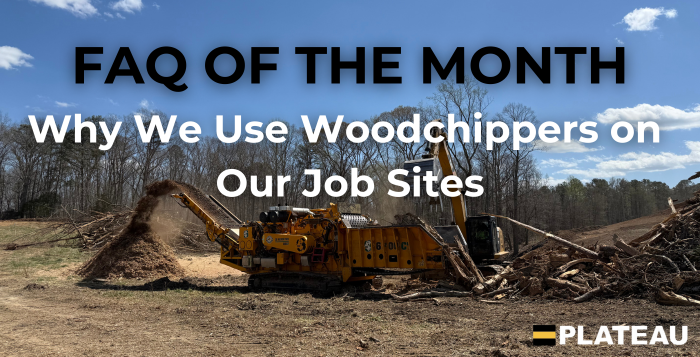Plateau Excavation

Why We Use Wood Chippers on the Job Site
When it comes to land clearing and site prep, efficiency is everything. The wood chipper is one of the most valuable — and often overlooked — machines on any job site. While it may not be the loudest piece of equipment (okay, maybe it is), it plays a crucial role in keeping projects moving smoothly and sustainably.
Turning Debris Into Usable Material
On our job sites, you’ll typically see an excavator feeding brush, limbs, and even full tree trunks into the chipper. In just minutes, what was once a tangled pile of debris is transformed into a neat mound of mulch. This not only keeps the work area clean and safe but also speeds up the overall progress of the job.
A More Sustainable Way to Clear Land
Wood chippers offer more than just convenience — they also help reduce environmental impact. Rather than hauling debris to a landfill or burning it (both of which create pollution), we process everything on-site. This approach significantly reduces emissions from transportation and avoids contributing to air pollution.
What Happens to the Wood Chips?
The mulch produced by the chipper doesn’t go to waste. It can be repurposed in several valuable and eco-friendly ways:
-
Erosion control on slopes and construction areas
-
Landscaping mulch to suppress weeds and retain soil moisture
-
Biomass fuel to generate renewable energy
By recycling natural materials on-site, we minimize waste and promote a circular use of resources — a smart move for the job site and the environment.
Built for Big Jobs
For large-scale projects, we rely on heavy-duty horizontal grinders. These powerful machines are designed to handle thick logs and heavy brush quickly and precisely. They’re mobile, efficient, and built to meet demanding job site needs.
Conclusion
Wood chippers are essential to modern construction and land clearing. They make cleanup faster, reduce environmental impact, and turn waste into valuable resources. Next time you see one in action, know it’s doing more than just spitting out mulch — it’s helping build a cleaner, greener job site.